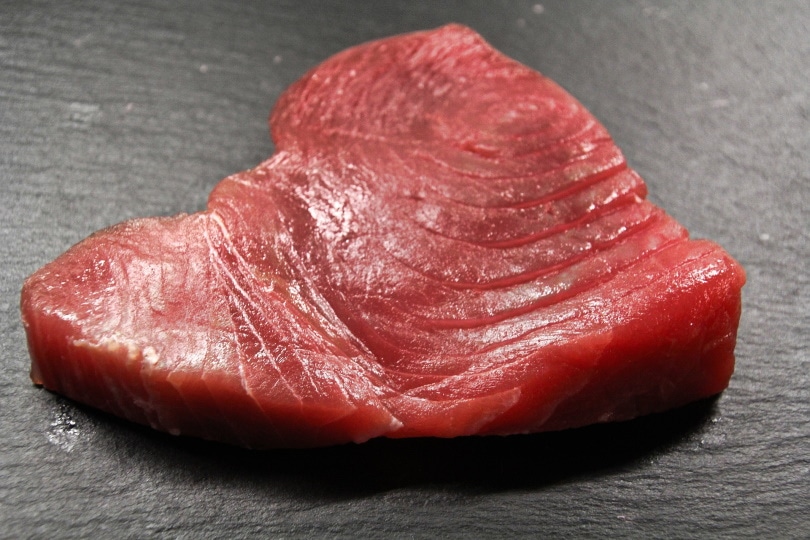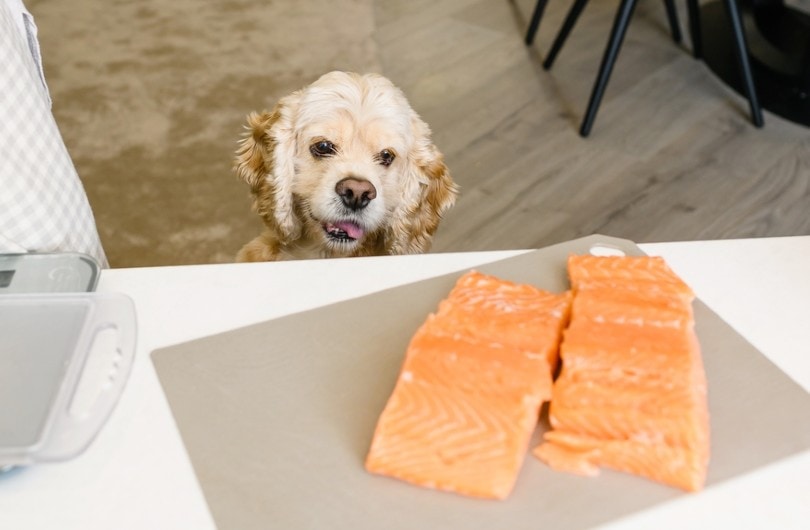
Click to Skip Ahead
Tuna is a popular and nutritious fish that many of us enjoy in various dishes. As pet owners, we often wonder if it’s safe to share this tasty treat with our four-legged friends.
So, can dogs eat tuna? The short answer is yes, dogs can eat tuna, but with some important caveats.
In this article, we’ll take a look at the potential benefits and risks of feeding tuna to your dog, as well as provide guidance on what to do if your pup has indulged in too much of this fish. Considering feeding your dog tuna? Let’s jump right into this tuna topic and ensure we make the right choices for our canine companions!
Can Dogs Eat Tuna?
Yes, dogs can eat tuna, but it should be done in moderation and with some considerations. Tuna is rich in protein, vitamins, and minerals, making it a nutritious addition to a dog’s diet.
However, feeding your dog tuna as a primary food source is not advisable. Dogs are omnivores, and their diet should be well-balanced with a mix of proteins, carbohydrates, fats, and other essential nutrients. While tuna is beneficial in small amounts, it shouldn’t replace their regular dog food.

Is Tuna Healthy for Dogs?
In moderation, tuna can offer health benefits to your dog. It’s an excellent source of lean protein, which supports muscle growth and repair. Additionally, tuna contains omega-3 fatty acids, known for promoting healthy skin and a shiny coat. These fatty acids also contribute to joint health and may help reduce inflammation, benefiting dogs with arthritis or other joint issues. The presence of essential minerals like potassium and magnesium in tuna can also support proper nerve and muscle function.
Potential Benefits of Tuna as a Snack
Treating your dog to a small amount of tuna can be a delightful and nutritious snack. Some pet owners even use tiny tuna pieces as training treats, especially for dogs that are fond of the fishy aroma. The high protein content in tuna can make your furry friend feel fuller for longer, which might be helpful during long walks or training sessions. Just remember to opt for plain tuna packed in water, not oil or seasoned variants that may contain harmful ingredients like garlic or onion.
What Makes Tuna Dangerous for Dogs?
While tuna can offer some health benefits, there are also potential risks associated with feeding it to your dog. One of the main concerns is the mercury content in certain tuna species. Mercury is a heavy metal that can be toxic to dogs when ingested in excessive amounts. Over time, mercury can build up in your dog’s system and lead to mercury poisoning, which can have severe consequences for your pup’s health.

Signs of Mercury Poisoning to Look Out For
Mercury poisoning can be dangerous for dogs and should not be taken lightly. Some common signs of mercury poisoning in dogs include loss of appetite, vomiting, diarrhea, weakness, and muscle tremors. In severe cases, it can lead to neurological issues and even be fatal. If you suspect your dog has consumed an excessive amount of tuna or is displaying any of these symptoms, seek immediate veterinary attention.
Risks of Feeding Tuna to Dogs
Aside from mercury concerns, another issue with feeding tuna to dogs is the potential for an allergic reaction. Some dogs may be allergic to fish or specific proteins found in tuna, leading to itching, skin irritation, or digestive problems. Additionally, tuna packed in oil can be too rich for dogs and may cause gastrointestinal upset, leading to vomiting or diarrhea.
My Dog Ate a Lot of Tuna, What Should I Do?
If your dog has managed to get into a large amount of tuna, don’t panic, but don’t ignore it either. Contact your veterinarian right away, providing information on the amount and type of tuna your dog consumed. The vet will be able to assess the situation and advise you on the best course of action. They may recommend a visit to the vet or other treatments to prevent any potential complications.

Should I Feed My Dog Tuna?
Considering both the benefits and risks, it’s best to limit tuna consumption for your dog. Offering tuna as an occasional treat or as an ingredient in homemade dog food, in small portions, can be acceptable for most dogs.
If, however, your dog has any known allergies or sensitivities, it’s better to avoid tuna altogether. Instead, prioritize a well-balanced and commercially prepared dog food that meets your pet’s nutritional requirements.
Can Dogs Eat Canned Tuna?
Yes, dogs can eat canned tuna, but it should be in moderation and with caution. Canned tuna is often packed in water, which is the safer option for dogs, but varieties packed in oil or seasoned should be avoided due to potential harmful additives like garlic or onion.
While canned tuna can provide beneficial nutrients like protein and omega-3 fatty acids, the risk of mercury poisoning and allergic reactions still remain a concern. It’s essential to prioritize a well-balanced diet for your dog and consult with a veterinarian before introducing canned tuna or any new food into your dog’s diet to ensure their health and well-being.
What Are Safer Fish Alternatives?
If you want to treat your dog with fish, but you’re concerned about tuna’s risks, there are safer alternatives to consider with a lower mercury content. Salmon, for example, is an excellent source of omega-3 fatty acids and is generally considered safe for dogs. Always ensure the fish is fully cooked and free of any seasoning or harmful additives. Additionally, sardines and mackerel can also be a healthy option for dogs in moderation.

Final Thoughts
While dogs can eat tuna in moderation and enjoy some health benefits, it’s crucial to be aware of the potential risks, particularly mercury poisoning and allergic reactions. When offering tuna as a treat, choose plain tuna packed in water, and avoid seasoned or oily varieties.
As with any change in your dog’s diet, it’s best to consult your veterinarian to ensure it aligns with your pet’s specific needs. Ultimately, prioritizing a balanced diet and opting for safer fish alternatives can keep your canine companion healthy and happy in the long run!
Featured Image Credit: ubert, Pixabay
The post Can Dogs Eat Tuna? Vet Approved Facts & FAQ appeared first on Pet Keen.




